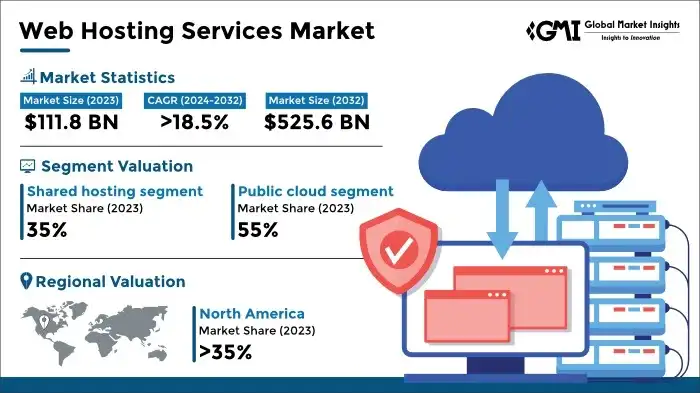The Best Hosting for High Traffic Sites
Website hosting is a service that lets you publish website files onto the internet. Hosting allows businesses to house, serve, and maintain files for one or more websites. Publishers need an enterprise-grade architecture for high-traffic websites. There can never be just one recommendation, and you must consider common factors like pricing, features, scalability, and support to pick the right hosting. Other than these, some factors to consider is that you need highly available hosting that promises and delivers 100% uptime and in-built caching. The global market for hosting networks designed for high-traffic sites is projected to reach $20.3 billion by the end of 2024, growing at a CAGR of 15.6% from 2021. North America remains the largest market, holding over 40% of the total market share, followed by Europe at 30% and Asia-Pacific at 20%.
Understanding the Needs of High-Traffic Sites
High traffic sites, be they e-commerce platforms, media outlets, or content-rich blogs, demand robust hosting to accommodate heavy incoming traffic. These sites require exceptional speed, reliability, scalability, and security to keep visitors engaged, conversions flowing, and user experiences smooth.
- Cloud Hosting- Unparalleled Scalability: Cloud hosting offers the scalability high traffic sites crave. Resources are distributed across multiple virtual servers, ensuring that sudden traffic spikes won't lead to server crashes. Providers like Amazon Web Services (AWS), Google Cloud, and Microsoft Azure offer cloud hosting solutions that let you scale up or down as needed. This adaptability ensures your site maintains optimal performance, even during peak traffic periods.
- Dedicated Hosting- Raw Power and Control: Dedicated hosting provides an entire physical server dedicated solely to your site. This raw power is perfect for sites experiencing high traffic. You have full control over the server's resources and configurations. Companies like Liquid Web and HostGator offer robust dedicated hosting options, ideal for media-heavy sites or those with intricate functionality.
- Virtual Private Servers (VPS)- Balancing Power and Cost-efficiency: VPS hosting sits between shared and dedicated hosting. It offers dedicated resources in a virtual environment, ensuring consistent performance and isolation from other users. Providers like Bluehost and SiteGround offer managed VPS solutions that suit high traffic sites looking for a balance between power and cost-efficiency.
- Managed WordPress Hosting- Optimized for Efficiency: For WordPress-based high traffic sites, managed WordPress hosting is a specialized solution. Providers like WP Engine and Kinsta optimize your hosting environment specifically for WordPress, ensuring faster loading times and automatic updates. This type of hosting is particularly useful for content-heavy blogs and news sites.
- Content Delivery Networks (CDNs)- Accelerating Global Access: CDNs are a supplementary tool that can significantly enhance the performance of high traffic sites. Services like Cloudflare and Akamai spread your site's content across multiple servers around the world. This reduces the physical distance between your site and its visitors, resulting in faster loading times and a better user experience, regardless of geographic location.

Linode offers powerful hosting solutions tailored for high-traffic websites, providing scalable resources, fast performance, and robust security. Ideal for businesses and platforms expecting large volumes of visitors or data.
Hosting for High Traffic Sites by Cloudways Hosting offers dedicated resources and scalability to handle high volumes of traffic. It ensures fast load times, reliable performance, and robust security. With full server control and the ability to scale as needed, Cloudways Hosting is ideal for websites with significant visitor demands.
DigitalOcean’s solution is ideal for hosting for high traffic sites with its simple load balancing which facilitates distribution of incoming traffic across various droplets to aid in better performance and availability.
WordPress VIP Hosting for High Traffic Sites provides enterprise-level hosting solutions tailored for large-scale WordPress websites with high traffic. It offers dedicated resources, advanced caching, robust security, automatic scalability, and expert support.
Interested in building fast, secure websites without the headache of backend engineering? Gatsby is a frontend for the headless web that allows you to build amazing websites by using React, ES6 and Material Design. Today, over half of all web browsing traffic comes from mobile devices. Having a fast website will make your business more attractive to potential customers and increase your revenue. With Gatsby you can easily create a website that loads quickly even on older hardware and offers great experiences by default.
The success of high traffic sites hinges on the hosting solution chosen. To ensure optimal performance, seamless user experiences, and the ability to handle fluctuations in traffic, selecting the right hosting type is imperative. Cloud hosting, dedicated hosting, VPS hosting, managed WordPress hosting, and the integration of content delivery networks all play crucial roles in catering to the demands of high traffic sites. By evaluating your site's specific needs and scalability requirements, you can confidently choose a hosting solution that keeps your platform running smoothly even as your visitor count continues to climb.
Hosting for High Traffic Sites FAQs
Our Editors’ Pick:
Browse these amazing publisher monetization tools handpicked by our team of editors










 (1).webp)


